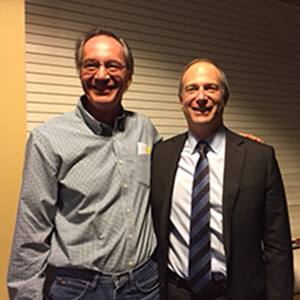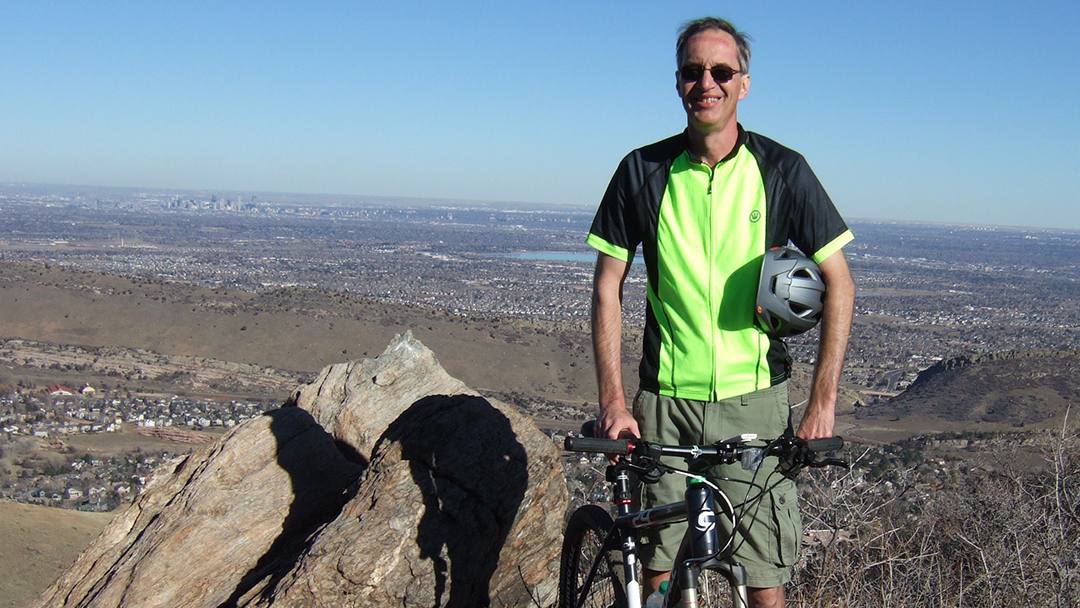-
Sharing Mayo Clinic: Mountain biker leaves cancer worries on the trail
A mountain bike accident triggered a chain of events that led Joel Pankow to seek treatment at Mayo Clinic for a kidney tumor he believed to be cancer. To his great relief, Joel’s care team found he didn't have cancer after all. Here Joel shares his Mayo Clinic experience in his own words.
Written by Joel Pankow
"This is very unlikely to threaten how long you live or your quality of life. This is the mantra I want you to tell yourself when you lie awake at night."
These words echoed through my mind on the plane as I traveled back from Rochester, Minnesota, to Denver in late 2016. They allowed me to thoroughly rest for the first time in over a month. Just six weeks prior, I had been told there was a tumor on my kidney — likely to be renal cell carcinoma.
Like many kidney tumors, mine was discovered incidentally. The tumor was found following a mountain bike accident that resulted in a foot injury. I had gotten into mountain bike riding in our community in the foothills of the Rocky Mountains to improve my physical and mental health. During recovery from my foot injury, I found myself having to urinate frequently at night. My urologist ordered an abdominal ultrasound and an MRI, which showed a 1-inch tumor on my right kidney. With a family history of cancer in general, I was naturally very anxious. Several Denver doctors even suggested complete kidney removal.
Confounded by what to do, I turned to my God-given skills as an analytical chemist to research and read everything I could on kidney cancer and treatment options. Along the way, I found the impressive annual issue of U.S. News & World Report Best Hospitals. It identified both Mayo Clinic and Johns Hopkins as not only top-ranked overall, but also top-ranked in urology.
I first traveled to Johns Hopkins where I learned about other options not mentioned by the doctors in Denver. The surgeon there told me if I wanted another opinion to go see Dr. Bradley Leibovich, chair of Urology and a kidney cancer specialist at Mayo Clinic in Rochester, Minnesota.
Upon returning home, I called Mayo Clinic and made an appointment with Dr. Leibovich and also with Dr. George Chow, who I was told by schedulers did a lot of robotically assisted partial nephrectomies. I was fortunate enough to secure two back-to-back appointments with Dr. Leibovich and Dr. Chow. The Mayo Clinic Concierge Services staff was most helpful in providing information about airfares for travel with special change-of-plan provisions as well as local lodging recommendations.
As soon as I walked into Mayo Clinic's impressive and modern Gonda Building with dozens of well-dressed staff milling about, polite and efficient folks at the check-in desk, and even someone at the elevators helping to direct patients, I immediately felt I was in a world-class facility.
[Dr. Leibovich] told me he couldn't tell me which option I should choose, but rather his job was to educate me on the options, and none of them would be a wrong choice. — Joel Pankow
When Dr. Leibovich walked into the exam room, I was struck by his calm, quiet and confident demeanor. Having seen other doctors and knowing that time is often limited to 20 minutes or so, I quickly asked him how much time we had together, so I could pace myself with my notepad full of questions and concerns. Sensing my anxiety, Dr. Leibovich said there was no rush. He had already looked at the imaging from Denver, and he asked if I would mind if he could begin by reviewing what we were looking at and what my options were. He also said he'd like to cut to the punchline, and then told me the above-quoted mantra.

Over the next hour, Dr. Leibovich proceeded to explain the pros and cons of four viable options I could choose from. As a scientist, I had come with research articles that we also discussed. He in turn printed out others for me to review as he continued to talk. His methodical, analytical and logical approach truly resonated with me. He told me he couldn't tell me which option I should choose, but rather his job was to educate me on the options, and none of them would be a wrong choice.
Of all the options, robotically assisted partial nephrectomy made the most sense to me. For that particular option, Dr. Leibovich highly recommended Dr. Chow, renowned as an expert and specialist in the field and this approach. Dr. Leibovich, Dr. Chow and the rest of their colleagues in Urology work together to ensure that each patient is treated by the physician who is most expert for that particular situation.
During my consult with Dr. Chow, I learned he was confident that robotically assisted partial nephrectomy was a great option for me. It would be a straightforward operation with no removal of adjacent tissue required because the team would use an approach called enucleation. Dr. Chow explained this preserves maximum kidney function. He contrasted it to a traditional approach, where tissue beyond the tumor is also removed, and he said there's no difference in outcome.
In fact, Dr. Chow said in his experience, tumors like the one he highly suspected I had simply peel right off the kidney surface. And both doctors agreed that although 78 percent of these types of tumor are cancerous, they are nonaggressive, less lethal and have a high rate of cure with the options they presented. Before I left Urology, I learned I could have surgery the following week. I was convinced this was the operation I needed at the right place with the right surgeon.
I was blessed by these medical professionals that are true healers that truly understand the body-mind-soul connection. — Joel Pankow
I returned to Rochester with my family a week later. The surgery was the day before Thanksgiving. After the tumor was removed during surgery, and even with the holiday that week, the Laboratory Medicine and Pathology Department quickly provided me with the results that I did not have cancer. Instead, the tumor was a benign oncocytoma. Of course, this provided for a very grateful Thanksgiving, indeed. Even the Mayo Clinic special Thanksgiving dinner delivered by the ever-friendly Food Services staff was delicious!
As I recovered, I reflected on how grateful I was to Drs. Leibovich and Chow for explaining the options and saving my kidney, to anesthesiologist Dr. Misty Radosevich for her compassionate care, to the entire surgical team, to Dr. Joseph Scales and his kind bedside manner during his rounds, and to the caring nurses. I was blessed by these medical professionals that are true healers that truly understand the body-mind-soul connection. Not only are they a credit to their profession, but they are part of the reason Mayo Clinic has the reputation it does as a world-class medical center. And I am also grateful to everyone that seems to make things happen seamlessly behind the scenes at Mayo Clinic, such as insurance preapproval, scheduling, pathology, food services and probably dozens of others.
Two recent follow-up visits to Rochester showed no remaining tumor. Everything has healed, and my kidney function remains equivalent to before surgery.
So what story do I tell family, friends and neighbors? I tell them I experienced an incredible chain of events, some happenstance, some fortuitous, others perhaps providence. But each one somehow only made possible because of the previous link in the chain. The first link started with my passion for mountain bike riding, leading to the next link where I broke my foot, and so on and so on down the chain, until the link where I was referred to Dr. Leibovich and the Mayo Clinic.
HELPFUL LINKS
- Learn more about kidney cancer.
- Read about the Department of Urology.
- Check out Mayo Clinic's Concierge Services
- Request an appointment.








